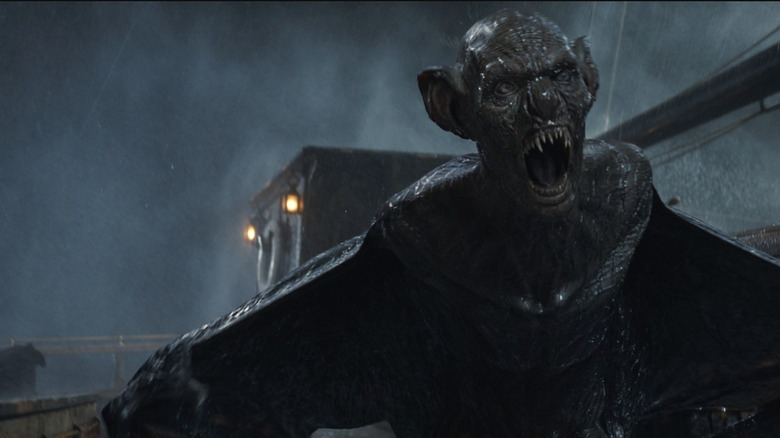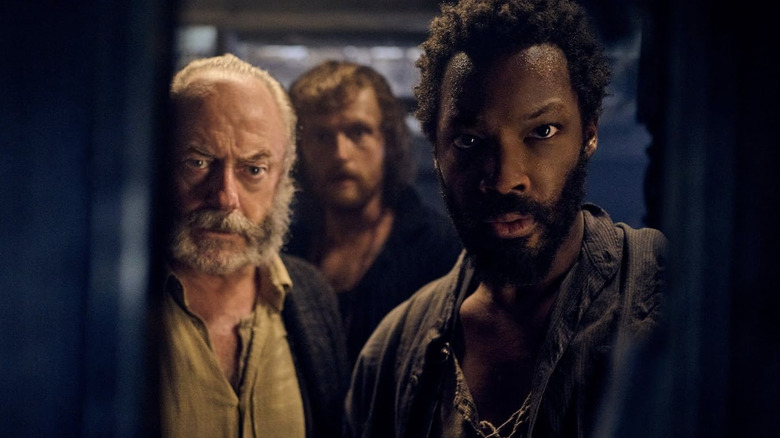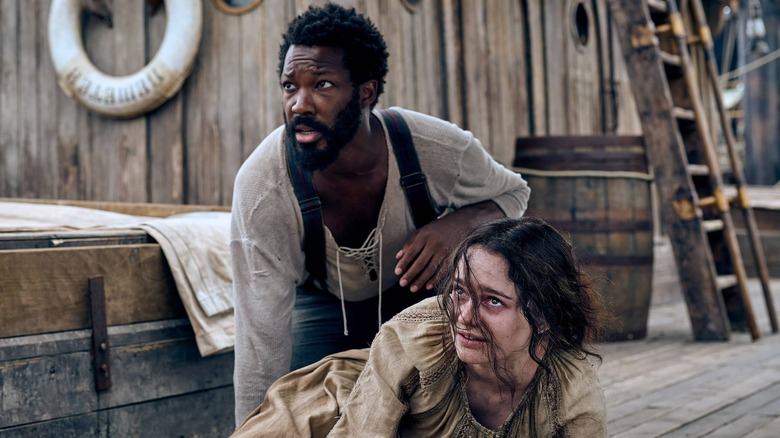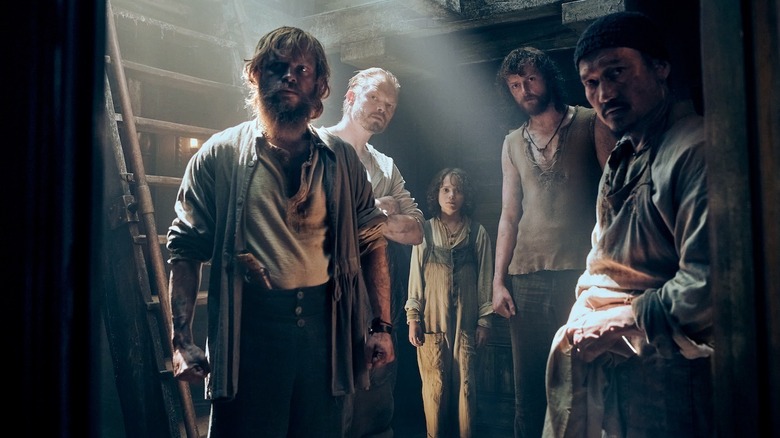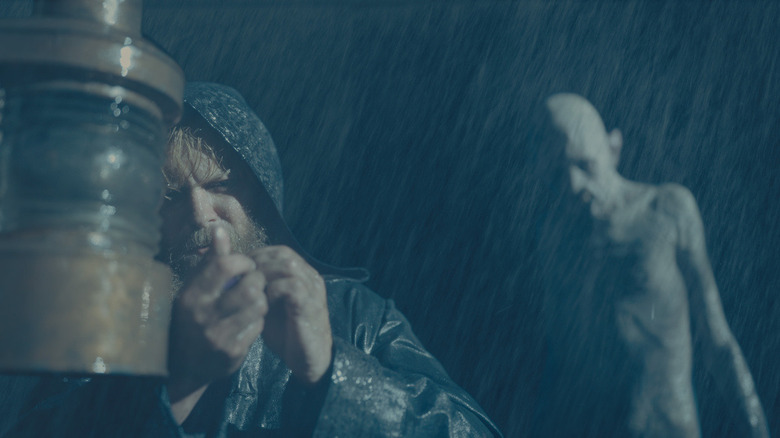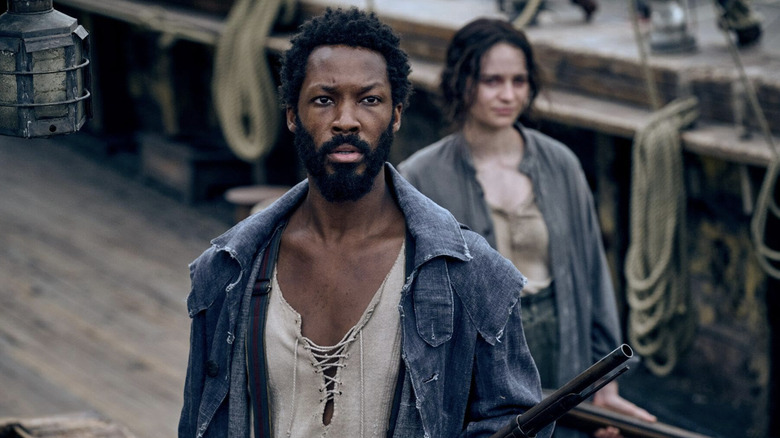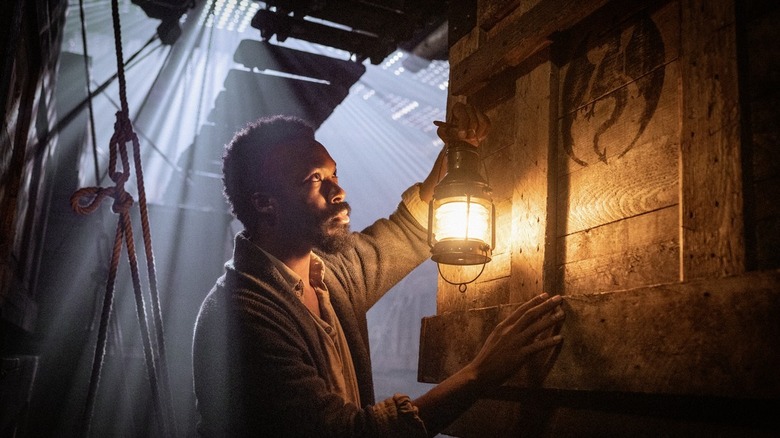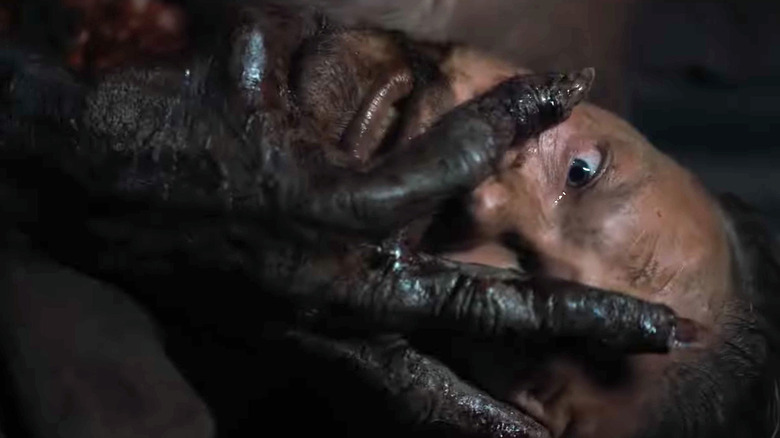The Last Voyage Of The Demeter Ending Explained: That Sinking Feeling
This piece was written during the 2023 WGA and SAG-AFTRA strikes. Without the labor of the writers and actors currently on strike, the movie being reviewed here wouldn't exist. This article also contains spoilers for "The Last Voyage of the Demeter."
When Mary Wollstonecraft Shelley published her novel "Frankenstein; or, The Modern Prometheus" in 1818, she kicked off genre fiction as we still know it to this day. She also captured the zeitgeist of that time period in regard to humanity's scientific study and technical progress, observing a relationship between the known and unknown where infinite possibilities lay, possibilities that carry with them a mixed sensation of wonder and fear.
79 years later, Bram Stoker captured a bit of that same vibe again, with his horror novel "Dracula." Taking a collection of various myths and folklore that had persevered through the ages and combining them with the deeds (embellished or not) of infamous historical figures like Vlad the Impaler and Elizabeth Bathory, Stoker created the most well-known example of the fictional vampire. Like "Frankenstein," "Dracula" is seemingly an eternally malleable creation; not only have there been numerous works of art inspired by the character and the book, but there are also nearly as many direct adaptations of the character and Stoker's novel, each with their own unique tones, themes, allegories and so on.
One of the core themes seen in most adaptations of "Dracula" is the way the titular vampire is able to achieve his goals thanks to exploiting human weaknesses: the superstitious are too fearful and easily dismissed by the "civilized" intellectuals, themselves easily manipulated into believing vampires aren't real. In adapting a single chapter of "Dracula," "The Last Voyage of the Demeter" (read our review here) captures this conflict in miniature, using the pressure-cooker single location of the doomed vessel to make its characters confront the reality of Dracula, recognizing him as a threat only too late.
Ill omens
Like any good horror film, "The Last Voyage of the Demeter" presents its characters with numerous warnings and omens that go foolishly unheeded. The movie even goes one further than that, presenting the audience with ill tidings by opening on August 6, 1897, when the destroyed and deserted ship Demeter is found crashed on the shore near the seaside town of Whitby, England. As the shaken men who discover the ship and the captain's logbook come to realize, there are no survivors.
Flashing back to July 6, 1897, we're introduced to Captain Eliot (Liam Cunningham) and his first mate, Wojchek (David Dastmalchian), as they attempt to crew up the Demeter for what Eliot intends to be his final journey. Clemens (Corey Hawkins), a doctor in desperate need of work, is itinerant, his status as an educated Black man meaning that bigots refuse his services. Wojchek refuses him for the ship's duty, dismissing him as simultaneously over- and under-qualified. Yet one of the men the first mate chooses instead almost kills Eliot's young son, the cabin boy Toby (Woody Norman), when he drops a large wooden crate after seeing a symbol of a dragon stamped on it.
Eliot and Wojchek dismiss the image as hysterical superstition and hire Clemens to replace the frightened man. They make no connection between the man's reaction to the symbol (which appears to be the mark of the Order of the Dragon), nor the way the Transylvanian villagers refuse to load the crates marked with that symbol onboard the Demeter, paying Wojchek a large sum of money ("More than I paid for them to bring it here," the first mate remarks) for the ship's men instead. The Demeter sets sail with the crates intact, blissfully unaware of what the cargo really holds.
Blood bag
That all changes one night during the voyage when Clemens discovers that some of the crates in the cargo hold have been displaced and tampered with. In a pile of dirt, he finds the body of Anna (Aisling Franciosi), a young woman at death's door due to, as Clemens diagnoses it, a blood disease. At the same time, the crew begins finding strange happenings about the ship, most alarmingly the graphic deaths of their livestock and the ship's dog, Huck. Captain Eliot puts forth a theory that these animals are victims of a viral malady passed by bite wounds, an idea that Clemens can't easily swallow. As the doctor reveals during a meal, his major interest in life lies in making sense of the unknown, a quality that doesn't allow him to readily accept such easy explanations.
The male crew members have a different explanation for the occurrences: the presence of Anna on board as a stowaway and a woman brings superstitious bad luck on both counts. As Clemens continues to administer blood transfusions to Anna, nursing her back to health, the woman eventually regains consciousness and explains that her being on board is indeed bad luck, but not in the way the crew thinks.
She reveals that the vampire known as Dracula (Javier Botet) has been smuggled onto the ship in one of those crates filled with soil, and his ultimate destination is Carfax Abbey, in London. The reason for his voyage is that he must go someplace where his potential victims do not know of him or the danger he poses; Anna's villagers not only know how to avoid him, they know how to appease him, having chosen Anna and others like her as live sacrifices, thereby turning them into living blood bags.
Toby or not Toby
Even when faced with the uncomfortable reality of Dracula being on their boat, the crew of the Demeter attempt to treat the problem as they would if any wild animal had gotten on board. What they fail to realize, of course, is that Dracula is neither man nor beast, a being who isn't just following his nature but also his desire. He is, in no uncertain terms, Evil with a capital "E."
The men of the Demeter learn this lesson the hard way, especially when the sailor Olgaren (Stefan Kapičić) is attacked by Drac during the vamp's nightly hunt, but doesn't die right away. Clemens discovers that transfusing Olgaren won't work, and the man reawakens the following night, immediately attacking Toby. When the rest of the crew rush to Toby's aid, subduing Olgaren, they fail to realize that Dracula has found his way to the boy instead, feeding on the youth while the men watch helplessly.
The crew is further traumatized when Olgaren, tied to the ship's mast, is incinerated by the rising of the sun and burned to a crisp. Clemens, finally beginning to come around to believing Anna's story, insists that Toby cannot be saved, arranging for a burial at sea. A distraught Eliot refuses to let his men toss Toby overboard, and the boy, now a vampire, attacks the captain in broad daylight, making his demise a scarring event in more ways than one. By this point, it's apparent that director Andre Øvredal is not going to pull any punches with this story, certainly not for matters of taste or morality.
Facing the unknown
The systematic attacks by Dracula as well as the step-by-step discovery of his abilities serve several purposes: for one thing, it gives the film a slasher-like structure where Dracula dispatches one victim at a time in various grisly ways (a quality that emulates Ridley Scott's "Alien"). For another, it slowly leads Clemens and his compatriots down a path of understanding and, eventually, acceptance that such a thing as a vampire is real. There's also a third reason, perhaps the most insidious of all: as Anna points out, Dracula isn't merely toying with the humans — he's rationing them.
Armed with the knowledge that Dracula intends to wipe out every last person on the Demeter and that his arrival in London means the certain deaths of countless other victims, Clemens rallies the remaining survivors to attempt to ambush Dracula as well as ensure the Demeter does not reach port by sinking it. Wojchek, who was to be made Captain by Eliot after this voyage, refuses that last point at first. Yet Clemens, who by now has begun to accept the potential truth within superstition and the supernatural, reminds him that a ship survives not within the literal wood it's made from, but within the people who were part of it.
Clemens, Anna, and the other survivors do their best, but Dracula proves to be a formidable foe. Clemens even attempts to diminish some of Dracula's power, declaring that although he admits he does not understand how the vampire exists, he does not fear him, to which Dracula chillingly replies: "You will." Fortunately, Anna and Clemens are able to distract Dracula long enough to pin him to the ship's mast while they flee into the ocean, and the Demeter reaches its final destination as it crashes ashore.
One last sunrise
Of course, Dracula is not so easily defeated: as soon as the Demeter stops moving, the vampire is able to triumphantly free himself from the ship (in a moment that recalls one of the film's other inspirations, F.W. Murnau's "Nosferatu"). Meanwhile, Clemens and Anna are left floating on some stray pieces of wood a mile or so offshore, and Clemens makes the tragic discovery that Anna has indeed been infected with vampirism.
That doesn't mean the woman has lost her humanity, however: in her final act of defiance, Anna refuses to succumb to Dracula's influence over her, rejecting her thirst for blood and instead choosing to meet the sunrise one last time. As Anna burns, the moment seems to recall the tragedy of "Rogue One: A Star Wars Story," itself a movie that functions in a similar fashion to "Demeter," telling a story that fills in a previously blank bit of lore.
Vampire hunter D (for Doctor)
The final moments of "The Last Voyage of the Demeter" are the most surprising: Øvredal, along with writers Bragi F. Schut and Zak Olkewicz, excitingly break the rules the film seemed to establish. To wit: the Demeter is not canonically supposed to have any survivors (save Dracula, of course), and yet Clemens still lives after his ordeal.
In much the same way culture was never the same after the publications of "Frankenstein" and "Dracula," Clemens is a changed man, a scholar and intellectual who nonetheless concedes the existence (or at least potential existence) of the supernatural. In honoring his fallen shipmates and the woman who refused to be given to the creature, he's now made it his mission to hunt Dracula down in London.
Earlier in the film, Anna explains how Dracula can take the shape of a man, and most adaptations of "Dracula" take this literally, having him appear as human as anyone. In a nod to both "Nosferatu" as well as Tobe Hooper's adaptation of Stephen King's "Salem's Lot," this Dracula does not make himself look human so much as camouflage himself in order to blend in with humans, making him a bit like the mutated cockroaches in Guillermo Del Toro's "Mimic." It's a perfect encapsulation of the film's take on Dracula and vampires in general, allowing the relationship between the supernatural and the natural to be uncomfortably close, and not going so far as to take magical shortcuts.
Dracula remixed?
While "The Last Voyage of the Demeter" is a pleasingly nasty, single-minded horror film, it leaves a lot of room for the future should the movie be successful. In other words, this is not like "Rogue One" insofar as it's meant to fit seamlessly into the canon of another adaptation of "Dracula" — instead, it's its own adaptation of Stoker's novel, just exclusively focusing on the one chapter that is often neglected or glossed over.
With that in place, there's the explicit possibility that a sequel could continue the "Dracula" story with this new character of Clemens continuing on, causing further ripple effects in the adaptation. Would this last survivor of the Demeter effectively replace vampire hunter Abraham Van Helsing, or join him on his quest? If this film is the "Alien" of "Dracula" adaptations, might Clemens next find himself in an "Aliens" situation, forced to face his nemesis in increased numbers for a second round? What is that stylish cane that Dracula sports, the one with a silver wolf's head — isn't it remarkably similar to the one owned by Sir John Talbot in 1941's "The Wolf Man?" Is Universal attempting to restart their "Dark Universe" of Monsters?
Whatever happens, it's clear that "The Last Voyage of the Demeter" is as good an example as any that the "Dracula" novel is one of the most enduring and endlessly fascinating stories ever written, one that isn't — and needn't be — told the same way twice.
